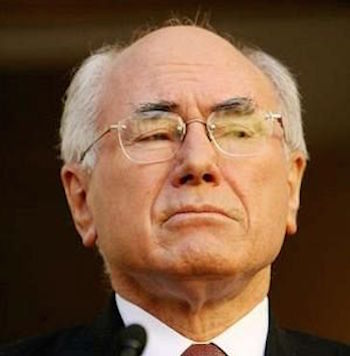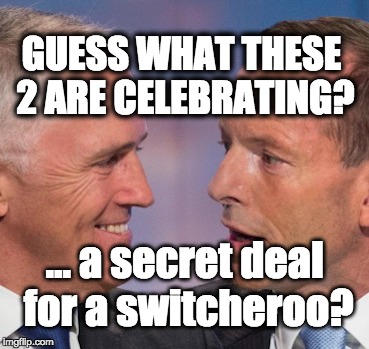John Howard's continued lies about the reasons for invading Iraq in the face of the scathing Chilcot Report remind us of his deep dishonesty and poor judgement, writes editor Sandi Keane.
BACK IN 2004, the “who can you trust” slogan was effective. It won Howard the election. Such was George W. Bush’s admiration, he stole the line for his own campaign.
But Howard and trust parted company when we found out Australia had invaded Iraq in 2003 on the basis of a lie. He had exaggerated the threat of Sadam Hussein. There were no weapons of mass destruction. This information was known to the U.S., Britain and Australia almost two years before the Coalition of the Willing's invasion of Iraq (see below).
After the release of the Chilcot Report, Britain is now confronting its ties to the United States as one of the Coalition of the Only Too Willing that cost British lives. A contrite Tony Blair responded by saying:
"I express more sorrow, regret and apology that you can ever know or believe"
whilst maintaining he'd made the right decision.
But unlike even Tony Blair, Howard says he has no regrets about Iraq. Australians are unlikely to ever see him apologise. It isn't within his "little man" character to ever apologise for his dishonesty and poor judgement. His failure to repent is a character flaw. Jumping on the Bush bandwagon and "shirt-fronting" Saddam Hussein from the safety of his Canberra bunker would have given Howard the chance to shake off his little man image and become the people's hero. As I will later demonstate in this article, by way of evidence, his memoir 'Lazarus Rising' is full of boastful flights of fancy (like claiming to be East Timor's "liberating hero") and is, as such, a litany of lies.
On the 10th anniversary of the Iraq Invasion in April 2013, Howard gave an Iraq retrospective lecture for the the Lowy Institute. He seized the moral high ground in true Pecksniffian style, labelling claims about flawed intelligence as "notorious" meriting the most "emphatic rejection".
Following the Chilcot Inquiry showing that the intelligence was, indeed, "flawed" and the invasion a "strategic blunder", Howard remains unrepentant. How unsurprising for a man of his weak character.
The anniversary turned the spotlight back on the allies and this shameful chapter in our history. Peter Hartcher’s ‘Blind allies of mass destruction’ in the Sydney Morning Herald accused Howard, Bush and Blair of collaborating in a war built on a lie that cost the lives of more than 100,000 Iraqi civilians.
Lazarus Rising — Howard's truth-dodging memoir, best described as "Lazarus Lying"
Political memoirs offer a chance to "fess up" and clear the slate as a salute to historical accuracy, not to mention accountability — a last chance to make good. But, sadly, this was not the case in John Howard’s, self-serving, truth-dodging memoir, Lazarus Rising.
The prime minister was in Washington at the time of 9/11. He knew President Bush was looking to fit Saddam Hussein up when he instructed his intelligence aids to come back with a link in spite of U.S. intelligence having dismissed Saddam’s possession of WMDs years before.
In Lazarus Rising (p 427), Howard tries to justify that it was
'...right to act on a reasonably entertained belief that Iraq did possess WMDs (p 425) by claiming that concern about WMDs was “soundly based in fact.'
Untrue. Fully two years before the invasion of Iraq, U.S. Secretary of State, Colin Powell, declared in Cairo of Saddam Hussein:
"He has not developed any significant capability with respect to weapons of mass destruction."
Furthermore, five months after Powell’s speech, the National Security Adviser, Condaleeza Rice, in an interview on national U.S. television put the lie to the US government’s own propaganda when she declared:
“Saddam has been disarmed and his military forces have not been rebuilt."
Powell and Rice assure everyone Iraq is NO THREAT, NO WMDs, pre-9/11 and pre Iraq Invasion
Unlike John Howard, Colin Powell has publicly confessed his shame at having supported the lie about WMDs.
As revealed by The Age back in 2004, Australia's primary military agency, the Defence Intelligence Organisation, also rejected claims that Saddam Hussein had "weapons of mass destruction".
Our military and diplomatic elders call for truth on the invasion of Iraq
On 8 August, 2004, a statement by a concerned group of former service chiefs and Australian diplomats was published in The Sydney Morning Herald calling for "honest, considered and balanced foreign and security policies".
Following exposure of the lie about Saddam's "weapons of mass destruction", former diplomat, Richard Woolcott, helped co-ordinate the group of 43 former service chiefs and diplomats who called for more honesty in government.
Woolcott told Independent Australia in an interview for my article 'John Howard: Lazarus Lying' that central to the group’s concerns was the lack of honesty in Howard’s statement in March 2003 that his policy was 'the disarmament of Iraq, not the removal of Saddam Hussein', and that 'if Saddam got rid of his weapons of mass destruction he could remain in power.'
Howard's rewriting of history on the liberation of East Timor
Perhaps the most cynical example of Howard’s re-writing of history is chapter 29 of 'Lazarus Rising', ‘The Liberation of East Timor’. Howard boasts how proud he is of 'one of the more noble things that Australia has done in years' in liberating East Timor.
In truth, a better title for Howard’s memoirs would be ‘Lazarus Lying’ with its boastful flights of fancy and litany of lies.
Howard's crude attempts to cloak himself in glory "after the fact" had already been well and truly debunked by many of Australia’s political commentators, foremost among them Michelle Grattan and Laurie Oakes.
Oakes was scathing about Howard’s fabrication of the events leading to the liberation of East Timor. His rebuke – 'Timor credibility gap' – is republished in his book 'Power Plays.' It predates Lazarus Rising by two years. If Howard read it, he remained defiant.
Oakes describes Howard (p 231) as:
'...so slavishy pro-Indonesian that he outdid even Whitlam when it came to brown-nosing Jakarta.”
The Australian community showed strong support for Timorese independence. Many diggers retained a deep affection after being sheltered by them from the Japanese in World War II. In Lazarus Rising, Howard’s history revisionism bestows plaudits he never earned. He does this by also recasting his former foe, Gough Whitlam, as the villain who stood in the way of East Timorese independence.
Thus, we read (p 336):
'The Whitlam government wanted to maintain close ties with Indonesia and acquiesced in the Suharto regime’s forcible incorporation of East Timor. The de facto recognition afforded by the Whitlam Government was consolidated with the de jure recognition decided upon by Fraser.'
But the Whitlam government was dismissed on 11 November 1975. Indonesia did not invade East Timor until 5 December 1975. It was the Fraser government, in which Howard was a senior minister, not the Whitlam government, which recognized the de facto Indonesian sovereignty on 20 January 1978.
Whitlam has always claimed he told Indonesians that Australia supported self-determination of the East Timorese. According to previously secret Foreign Affairs Department documents relating to East Timor, dating from 1974 to 1976, as early as September 1974, Whitlam told officials:
"I am in favour of incorporation [into Indonesia], but obeisance has to be made to self-determination."
Former Ambassador to Indonesia at the time, Richard Woolcott, told Independent Australia that, at the time, he had discussed the reference to Whitlam in Lazarus Rising with Mr Whitlam who was, at the time, not well, but was nevertheless very disappointed at what he saw as a deliberate attempt to discredit a former Prime Minister.
After the National Security Council meeting on 1 December 1998, Howard wrote to the Suharto’s successor, B.J. Habibie, urging direct negotiations with the East Timorese (as Whitlam had done).
Howard writes:
'For the first time in a generation, an Australian Government was proposing to reverse a longstanding, essentially bipartisan approach whereby East Timor’s status was subservient to good relations between Canberra and Jakarta.'
The claim is hokum and its triumphalism self-serving. Thanks to efforts by then shadow Foreign Minister, Laurie Brereton, and his policy adviser, Dr Philip Dorling, Labor policy had dramatically shifted on East Timor. Howard had little option but to follow Labor’s lead.
The policy, adopted by Labor caucus on May 26, called for a 'process of negotiation through which the people of East Timor can exercise their right to self-determination.' It also called for the reduction of troop numbers and the release of Xanana Gusmao and other East Timorese resistance fighters.
As Laurie Oakes wrote in the above column ten years earlier:
'...with bipartisanship shattered, the old crawl-to-Jakarta policy being followed by Howard was no longer sustainable.'
Laurie Brereton’s role in forcing Howard’s hand was also taken up by Michelle Grattan in an article on June 6, 2004 entitled ‘King maker bows out’, following Brereton’s retirement from Government.
Does John Howard have a Walter Mitty complex?
For the man who elevated "ordinariness" into a political commodity, does the reinvention of the quintessential Mr Milquetoast to "liberating hero" reveal a hitherto undiscovered Walter Mitty complex in John Howard?
Does little Johnny Howard's desire to be a "liberating hero" reveal a Walter Mitty complex?
Howard’s "ordinariness" fascinated Australia-watchers.
Writer, David Leser, described Howard as ‘colourless’.
Being ordinary and colourless may explain Howard’s Mitty-like fantasies. Could this be the flaw in his character that led him to jump on board the Coalition of the Willing in the vain hope of becoming a "liberating hero"?
The maxim that the bigger the lie, the more it will be believed won’t withstand today’s digital information highway. Howard’s track record on lies has been tailor-made for the Twittersphere. The "Lying Rodent" has long replaced "Honest John".
With a new Senate, isn't it time for Australia to conduct our own inquiry into the Iraq War?
The U.S., Britain and Denmark have all conducted inquiries into the Iraq invasion, but not Australia. Two years ago, on the tenth anniversary of the invasion of Iraq, the Greens renewed their call for an inquiry into Australia's participation in the war. Of one thing you can be sure, there are plenty of newcomers to the Senate anxious to reflect the will of Australians now calling for an inquiry. Will John Howard be man enough to hang his head in shame? Don't hold your breath!
You can watch the ABC Four Corners investigation aired on the 10th anniversary of the invasion of Iraq, 'The Spies Who Fooled the World' here.
You can also follow Sandi Keane on Twitter @Jarrapin.

This work is licensed under a Creative Commons Attribution-NonCommercial-NoDerivs 3.0 Australia License
Monthly Donation
Single Donation
Support independent journalism. Subscribe to IA for just $5.









